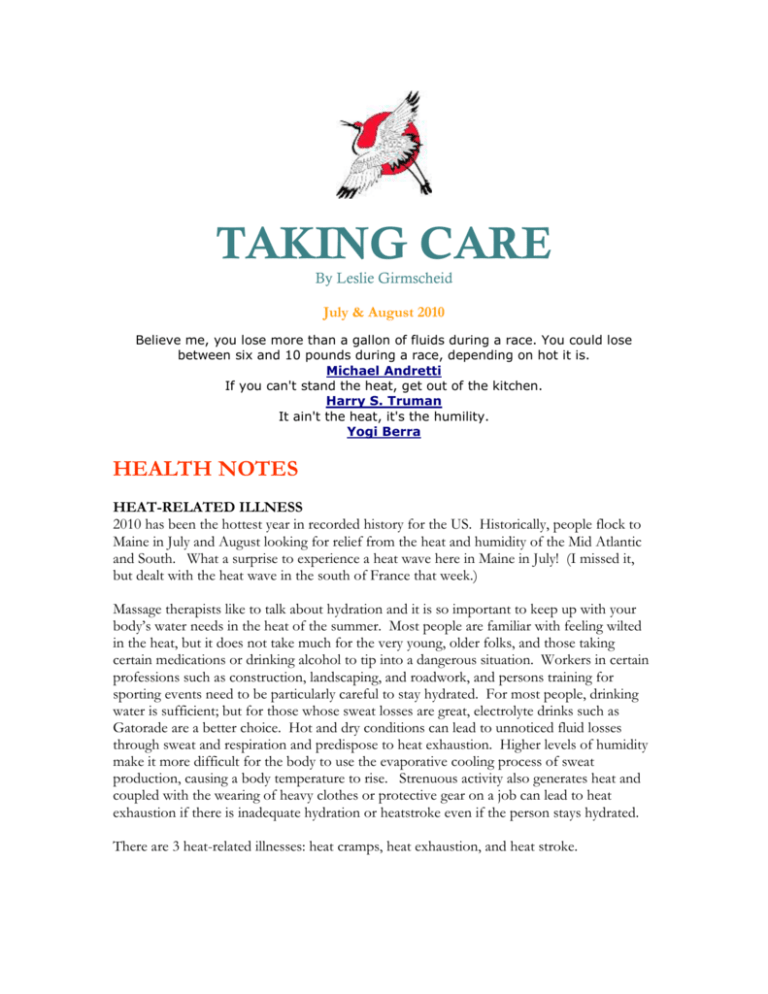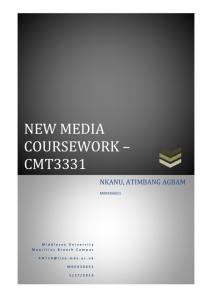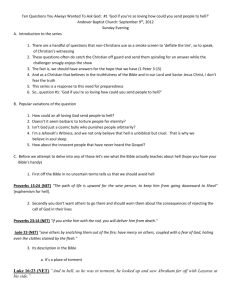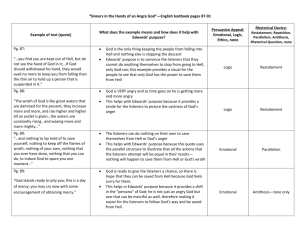NEWSLETTER #10 July & August, 2010 "Heat
advertisement

TAKING CARE By Leslie Girmscheid July & August 2010 Believe me, you lose more than a gallon of fluids during a race. You could lose between six and 10 pounds during a race, depending on hot it is. Michael Andretti If you can't stand the heat, get out of the kitchen. Harry S. Truman It ain't the heat, it's the humility. Yogi Berra HEALTH NOTES HEAT-RELATED ILLNESS 2010 has been the hottest year in recorded history for the US. Historically, people flock to Maine in July and August looking for relief from the heat and humidity of the Mid Atlantic and South. What a surprise to experience a heat wave here in Maine in July! (I missed it, but dealt with the heat wave in the south of France that week.) Massage therapists like to talk about hydration and it is so important to keep up with your body’s water needs in the heat of the summer. Most people are familiar with feeling wilted in the heat, but it does not take much for the very young, older folks, and those taking certain medications or drinking alcohol to tip into a dangerous situation. Workers in certain professions such as construction, landscaping, and roadwork, and persons training for sporting events need to be particularly careful to stay hydrated. For most people, drinking water is sufficient; but for those whose sweat losses are great, electrolyte drinks such as Gatorade are a better choice. Hot and dry conditions can lead to unnoticed fluid losses through sweat and respiration and predispose to heat exhaustion. Higher levels of humidity make it more difficult for the body to use the evaporative cooling process of sweat production, causing a body temperature to rise. Strenuous activity also generates heat and coupled with the wearing of heavy clothes or protective gear on a job can lead to heat exhaustion if there is inadequate hydration or heatstroke even if the person stays hydrated. There are 3 heat-related illnesses: heat cramps, heat exhaustion, and heat stroke. Heat cramps usually affect the extremities of persons who have been very active in a hot environment. These can be relived by rest and supplying the above mentioned electrolyte drinks or by fluids accompanied by some salty food. In the past salt tablets were often recommended, but these can irritate the stomach. Most Americans obtain more than enough sodium in their diet so these concentrated tablets are usually not necessary. Heat exhaustion occurs when there is inadequate fluid replacement for sweat losses. It can mimic other medical conditions such as hypoglycemia, blood loss and shock, or poisoning. Despite the heat and an internal temperature of 101 to 104 degrees, the skin can be cool and clammy and appear pale. The pulse can be weak and slow, and the person may be nauseous, slow on the uptake and be anxious and/or very fatigued. Fainting may occur. Treatment includes immediate rest in a cool area and fluid repletion (juice or another sweet drink would be a good choice to start in case of insulin shock). If the person does not respond quickly or has a very high temperature, more rapid cooling methods and IV hydration may be needed. Heatstroke is caused by the inability of the body to cool itself and is a life-threatening emergency which progresses rapidly. High humidity, wearing of heavy clothes or protective gear for a particular job, and working hard can predispose to this condition. The person may have a flushed appearance at first and complain of headache and dizziness. Unlike heat exhaustion, the skin is hot and dry and the internal temperature is very high—104 to 106. The heart rate is rapid and often the victim is breathing rapidly as well. Initial disorientation can progress to unconsciousness and be associated with seizures. The treatment is rapid cooling with hospitalization for monitoring of temperature and evaluation of mental status and kidney function. The bottom line is to take the heat seriously. Always keep plenty of fluids on hand (the colder, the better), wear appropriate clothing, stay in the shade, and take it easy. Keep an eye on the very young and the elderly whose heat regulating mechanisms are not 100%. For those who work in hot environments, evaluate the work situation carefully for risks and pace yourself. If work can be done very early or late in the day, try to schedule this accordingly and look out for your coworkers. OFFICE NOTES *****Many of you have asked if it’s OK to give my name out to friends, relatives, co-workers, and your doctors. The answer is definitely yes. The majority of my business is by word of mouth, and you are my greatest supporters. In fact, you earn $10 off a 1 hour massage for yourself each referral you send me. *****Need to start your vacation off on a relaxing note? Or are you on a “staycation” this summer and want a little TLC? You and your partner deserve a massage! Or do you need a vacation from your vacation? Call for an appointment. ****VACATION SCHEDULE I am now back from my vacation and so far should be around for the remainder of the summer. You may call or email me for appointments. Remember, if you are thinking: “I need a massage,” you can always e-mail me anytime day or night and not worry about waking anyone. *****GIFT CERTIFICATES are available. They are perfect for the holidays, birthdays, anniversaries, and as a thank-you for a job well done. ***** If you wake up ill, please call (after 7:30 a.m.) or email me as early as you can. I do not charge the cancellation fee if you are ill, since I cannot work on you. ***** If you or someone you know is looking to grow their business in the Portland metropolitan area, give me a call. LAUGH OF THE MONTH The Physics of Hell The following is an actual question given as part of the University of Washington's engineering mid-term. The answer was so "profound" that the Professor shared it with colleagues, which is why we now have the pleasure of enjoying it as well. Bonus Question: Is Hell exothermic (gives off heat) or endothermic (absorbs heat)? Most of the students wrote proofs of their beliefs using Boyle's Law (gas cools off when it expands and heats up when it is compressed) or some variant. One student, however, wrote the following: "First, we need to know how the mass of Hell is changing over time. So we need to know the rate that souls are moving into Hell and the rate they are leaving. I think that we can safely assume that once a soul gets to Hell, it will not leave. Therefore, no souls are leaving. As for how many souls are entering Hell, let’s look at the different religions that exist in the world today. Some of these religions state that if you are not a member of their religion, you will go to Hell. Since there are more than one of these religions and since people do not belong to more than one religion, we can project that all souls go to Hell. With birth and death rates as they are, we can expect the number of souls in Hell to increase exponentially. Now, we look at the rate of change of the volume in Hell because Boyle's Law states that in order for the temperature and pressure in Hell to stay the same, the volume of Hell has to expand as souls are added. This gives two possibilities: 1. If Hell is expanding at a slower rate than the rate at which souls enter Hell, then the temperature and pressure in Hell will increase until all Hell breaks loose. 2. Of course, if Hell is expanding at a rate faster than the increase of souls in Hell, then the temperature and pressure will drop until Hell freezes over. So which is it? If we accept the postulate given to me by Ms. Teresa Banyan during my freshman year, "...that it will be a cold day in Hell before I sleep with you," and take into account the fact that I still have not succeeded in having sexual relations with her, then, #2 cannot be true, and thus I am sure that Hell is exothermic and will not freeze." The student received the only "A" given. CONTEMPLATION A lecturer, when explaining stress management to an audience, raised a glass of water and asked, "How heavy is this glass of water?" Answers called out ranged from 20g to 500g. The lecturer replied, "The absolute weight doesn't matter. It depends on how long you try to hold it. If I hold it for a minute, that's not a problem. If I hold it for an hour, I’ll have an ache in my right arm. If I hold it for a day, you'll have to call an ambulance. In each case, it's the same weight, but the longer I hold it, the heavier it becomes." He continued, "And that's the way it is with stress management. If we carry our burdens all the time, sooner or later, as the burden becomes increasingly heavy, we won't be able to carry on. When we're refreshed, we can carry on with the burden. So, before you return home tonight, put the burdens (whatever they may be) down. Don't carry it home. You can pick it up tomorrow." Here are some great ways of dealing with the burdens of life: * Accept that some days you're the pigeon, and some days you're the statue. * Always keep your words soft and sweet, just in case you have to eat them. * Always read stuff that will make you look good if you die in the middle of it. * Drive carefully. It's not only cars that can be recalled by their maker. * If you can't be kind, at least have the decency to be vague. * If you lend someone $20 and never see that person again, it was probably worth it. * Never put both feet in your mouth at the same time, because then you won't have a leg to stand on. * Since it's the early worm that gets eaten by the bird, sleep late. * We could learn a lot from crayons... Some are sharp, some are pretty and some are dull. Some have weird names and all are different colors, but they all have to live in the same box. *A truly happy person is one who can enjoy the scenery on a detour. Enjoy your summer! Leslie Leslie Girmscheid, MD, NCTMB Licensed Muscular Therapist 3 Apple Tree Lane Cape Elizabeth, Maine 207-272-6027 ***If you no longer wish to receive this newsletter, just e-mail me and I will remove your name from the distribution list. (I do not sell my lists of names.) If you have any suggestions (topics, a clean joke), I welcome them. Let me know if there are formatting problems.








